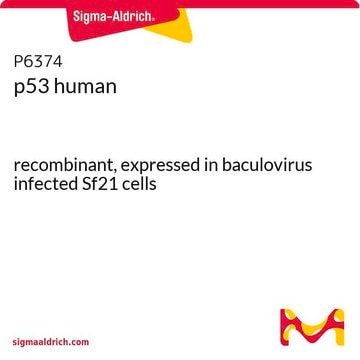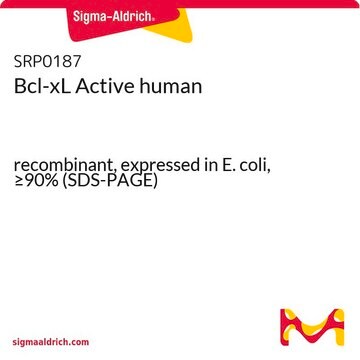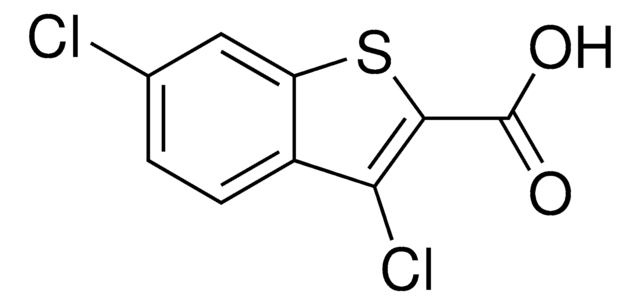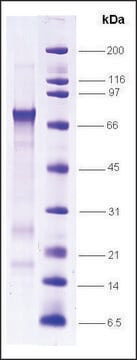SRP0186
Bcl-2 Active human
recombinant, expressed in E. coli, ≥80% (SDS-PAGE)
Synonym(s):
Apoptosis regulator Bcl-2, B-cell CLL/lymphoma 2, B-cell leukemia/lymphoma 2
Sign Into View Organizational & Contract Pricing
All Photos(1)
About This Item
UNSPSC Code:
12352200
NACRES:
NA.32
Recommended Products
General description
B-cell lymphoma 2 (BCL-2) is an anti-apoptotic and target gene of nuclear factor-κB (NF-κB). The protein is expressed in the nuclear envelope, mitochondria and endoplasmic reticulum. The gene encoding BCL-2 is localized on human chromosome 18q21. Human Bcl-2 (amino-acids 1-211) (GenBank Accession No. P10415) with C-terminal His tag, MW = 27 kDa, expressed in an E. coli expression system.
Application
Useful for the study of apoptosis, screening inhibitors and selectivity profiling.
Biochem/physiol Actions
B-cell lymphoma 2 (BCL-2) inhibits apoptosis in cells and has been shown to be upregulated in adenomas.
Physical form
Formulated in 25 mM Tris-HCl, pH 8.0, 100 mM NaCl, 0.05% Tween-20, 30% glycerol and 3 mM DTT.
Preparation Note
Thaw on ice. Upon first thaw, briefly spin tube containing enzyme to recover full content of the tube. Aliquot enzyme into single use aliquots. Store remaining undiluted enzyme in aliquots at -70°C. Note: Enzyme is very sensitive to freeze/thaw cycles.
Storage Class Code
10 - Combustible liquids
WGK
WGK 1
Flash Point(F)
Not applicable
Flash Point(C)
Not applicable
Certificates of Analysis (COA)
Search for Certificates of Analysis (COA) by entering the products Lot/Batch Number. Lot and Batch Numbers can be found on a product’s label following the words ‘Lot’ or ‘Batch’.
Already Own This Product?
Find documentation for the products that you have recently purchased in the Document Library.
Rr Suzy Indharty
Asian journal of neurosurgery, 8(2), 83-89 (2013-09-21)
Traumatic brain injury (TBI) is one of the major causes of death and disability. Apoptosis after TBI contributes significantly to the final extent of tissue damage. The Bcl-2 family proteins are important apoptosis modulators which increased in injured neurons. Bcl-2
Maria Lauda Tomasi et al.
Oncotarget, 6(35), 37706-37723 (2015-09-30)
Ubiquitin-conjugating enzyme 9 (Ubc9) is required for sumoylation and inhibits apoptosis via Bcl-2 by unknown mechanism. Methionine adenosyltransferase 2A (MAT2A) encodes for MATα2, the catalytic subunit of the MATII isoenzyme that synthesizes S-adenosylmethionine (SAMe). Ubc9, Bcl-2 and MAT2A expression are
Onursal Onen et al.
Sensors (Basel, Switzerland), 12(9), 12317-12328 (2012-11-01)
Changes in mass loading on the surface of acoustic biosensors result in output frequency shifts which provide precise measurements of analytes. Therefore, to detect a particular biomarker, the sensor delay path must be judiciously designed to maximize sensitivity and specificity.
Mitochondrial proteomic approach reveals galectin-7 as a novel BCL-2 binding protein in human cells.
Christelle Villeneuve et al.
Molecular biology of the cell, 22(7), 999-1013 (2011-02-04)
Although the anti-apoptotic activity of Bcl-2 has been extensively studied, its mode of action remains incompletely understood. Deciphering the network of Bcl-2 interacting factors is necessary to better understand the key function of Bcl-2 in apoptosis initiation. To identify novel
N Heidari et al.
Cell death & disease, 1, e76-e76 (2011-03-03)
Glucocorticoids (GCs) are common components of many chemotherapeutic regimens for lymphoid malignancies including acute lymphoblastic leukemia (ALL). The BCL-2 family has an essential role in regulating GC-induced cell death. Here we show that downregulation of antiapoptotic BCL-2 family proteins, especially
Our team of scientists has experience in all areas of research including Life Science, Material Science, Chemical Synthesis, Chromatography, Analytical and many others.
Contact Technical Service








